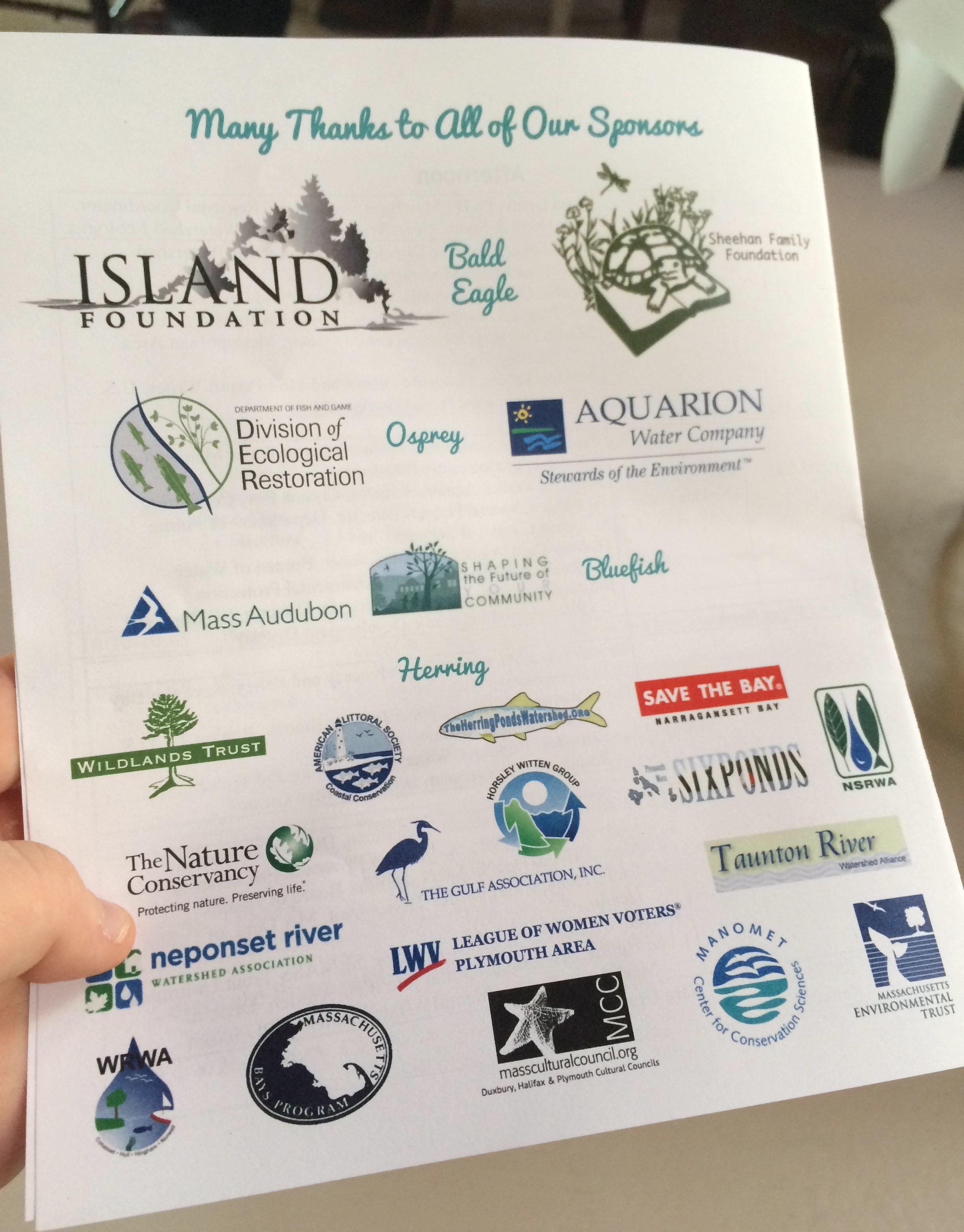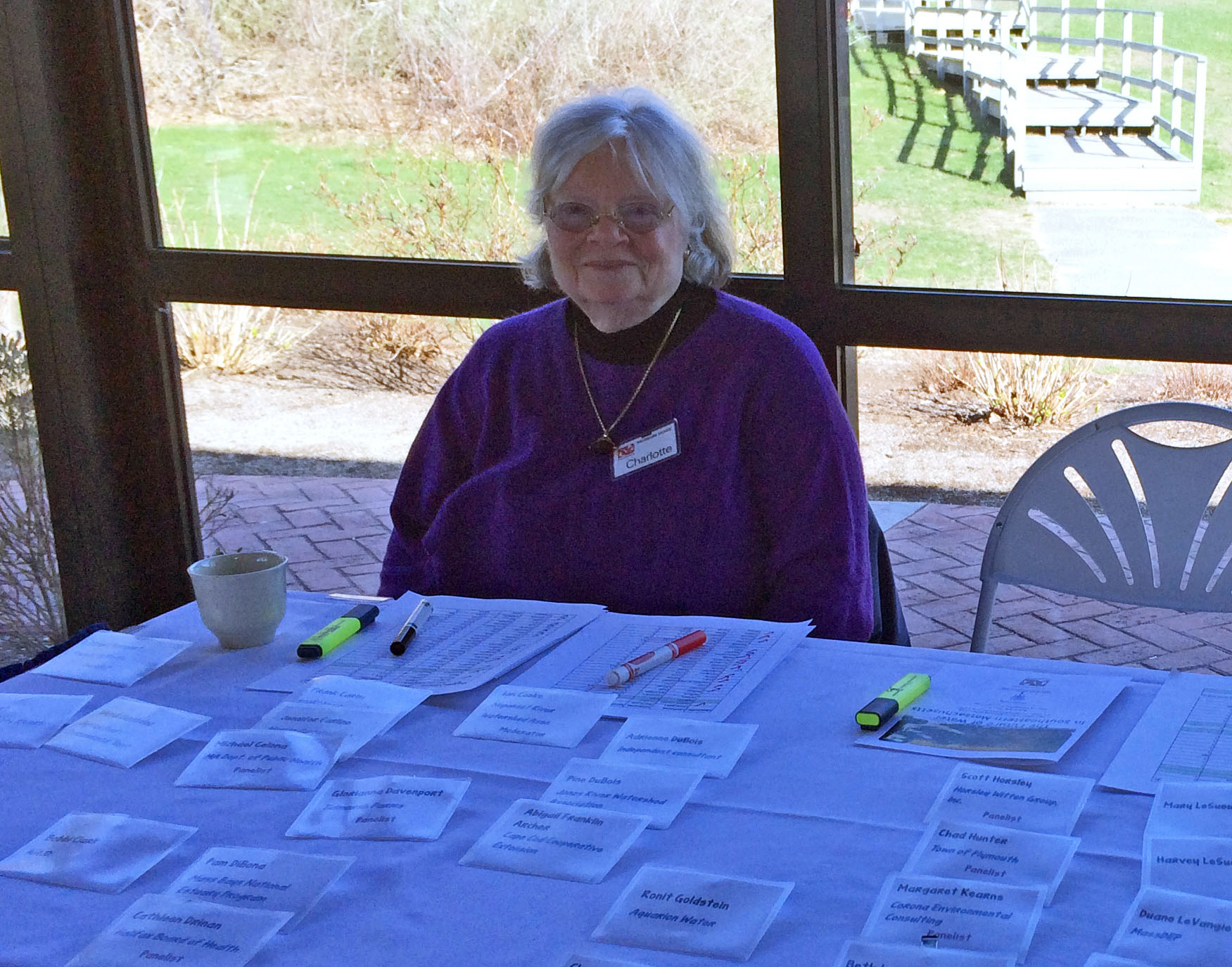
Watershed Action Alliance of Southeastern Massachusetts (WAA) presented The Future of Water in Southeastern Massachusetts, a conference to provide education, information and networking for clean, plentiful and free-flowing water, on April 24, 2015 in Plymouth, MA. Thanks to WAA’s partner, Plimoth Plantation, the lovely Peabody Pavilion, overlooking the Eel River was the conference location. One hundred fifteen people attended. Most hailed from southeastern Massachusetts, but some came from as far away as western Massachusetts, New Hampshire, Maine and Rhode Island. Many organizations were represented, such as departments of public works, universities, water management and provision businesses, conservation nonprofits, government agencies, local conservation commissions, watershed associations and independent consultants.
Media coverage was very favorable. For an article in Plymouth’s Old Colony Memorial, click here. To watch a story aired on Plymouth Area Community Television (PACTV), click here. To listen to a story aired on WATD, click here.
A synopsis of each session is provided below. Videos of each session are available on WAA's YouTube channel. Feel free to share them with your colleagues who were unable to attend.
Morning Sessions
Session 1: Fundraising for Water
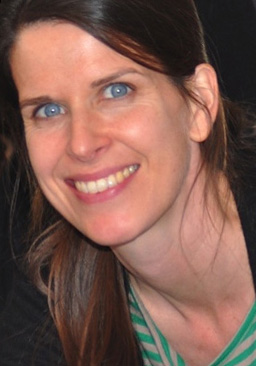
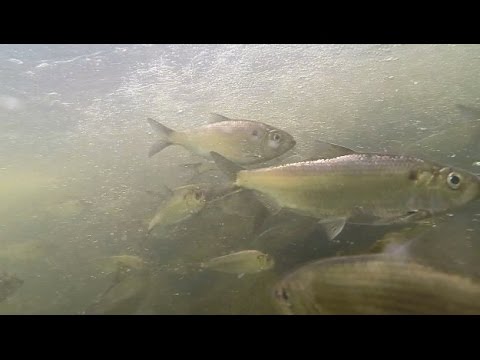 Session 2: Science and Data Collection
Session 2: Science and Data Collection
Alex Mansfield, Ecology Program Director with the Jones River Watershed Association, moderated a session on collecting scientific data on the health of our waterways. The panelists included UMass Boston professor Bob Chen who spoke about the use of modern remote sensing equipment and cell phones to collect data on the environment. Karen Bieluch, from Dartmouth College, discussed how volunteer and community based monitoring enhances not only our knowledge, but also engagement with citizens on environmental issues. The third panelist, Mike Trainor, a biologist with the Division of Marine Fisheries, spoke of emerging data collection technologies, such as the use of video (see frame capture at right) in monitoring herring populations.
Session 3: Outreach
Three educator-panelists, Lou-Anne Conroy, a teacher from Plymouth South High School, Glorianna Davenport, a cranberry bog owner and MIT Research Scientist, and Kim VanWormer, a Plimoth Plantation Program Manager, gave diverse examples of how their watershed education and awareness efforts can be leveraged for greater impact. The projects discussed included use of Watershed Stewardship Guide print materials combined with field studies for in-school youth, landscape-scale sensor technology streamed globally to the Internet (Living Observatory Project), and the Plimoth Plantation Herring Run Festival family activities.
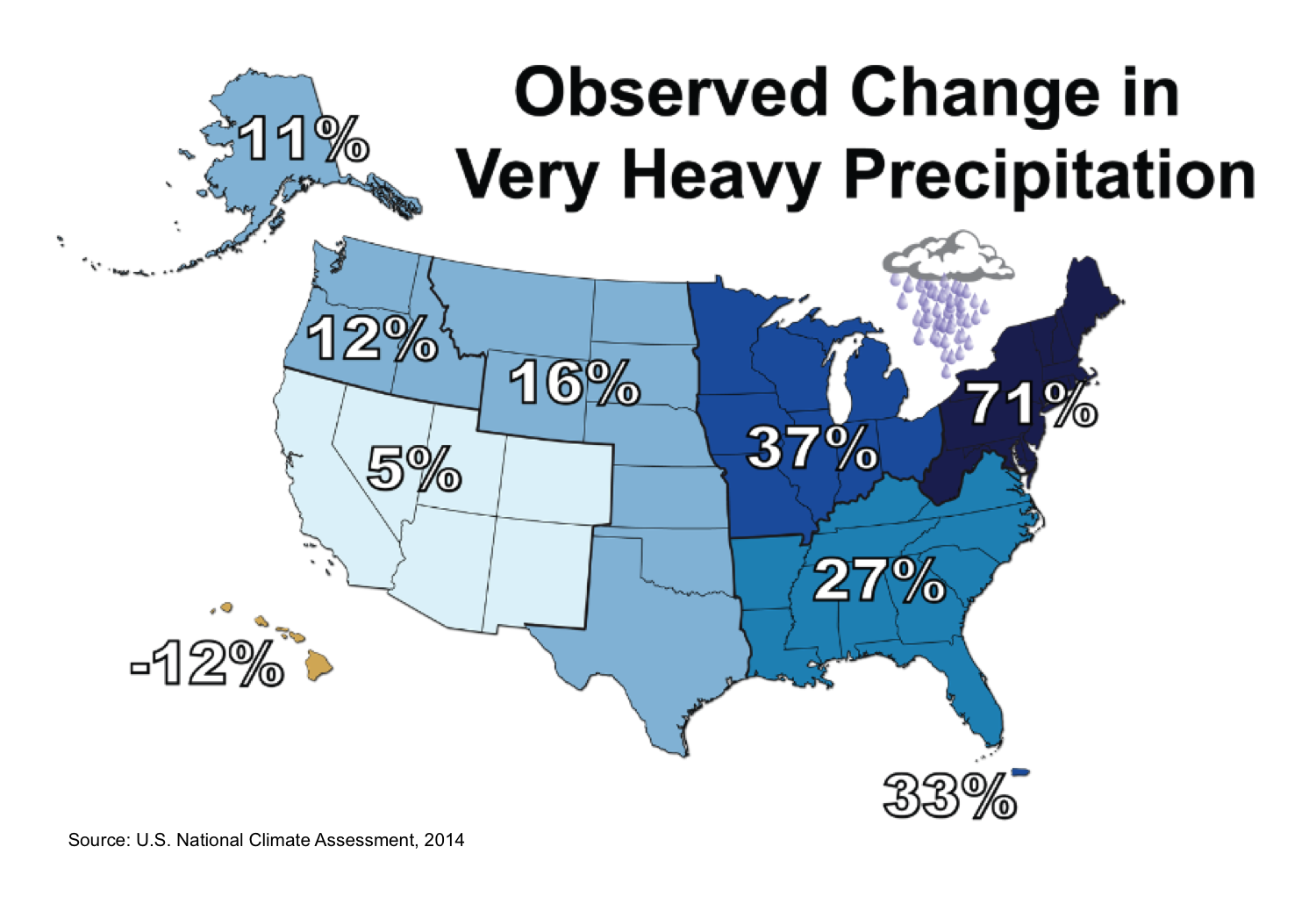 Plenary Speaker: Watershed Management in a Warming World
Plenary Speaker: Watershed Management in a Warming World
The conference plenary presentation, Watershed Management in a Warming World, was delivered by Eric J. Walberg, Senior Program Leader for Climate Services at Manomet Center for Conservation Sciences. The presentation included an overview of recent climate trends and projections both globally and regionally, an introduction to watershed-scale green infrastructure planning, example projects from Europe and the U.S., and a discussion of integrating climate concerns in watershed planning and management.
Afternoon Sessions
Session 4: Stormwater
Ian Cooke, Executive Director of the Neponset River Watershed Association, served as moderator of the stormwater session. The panelists were Newton 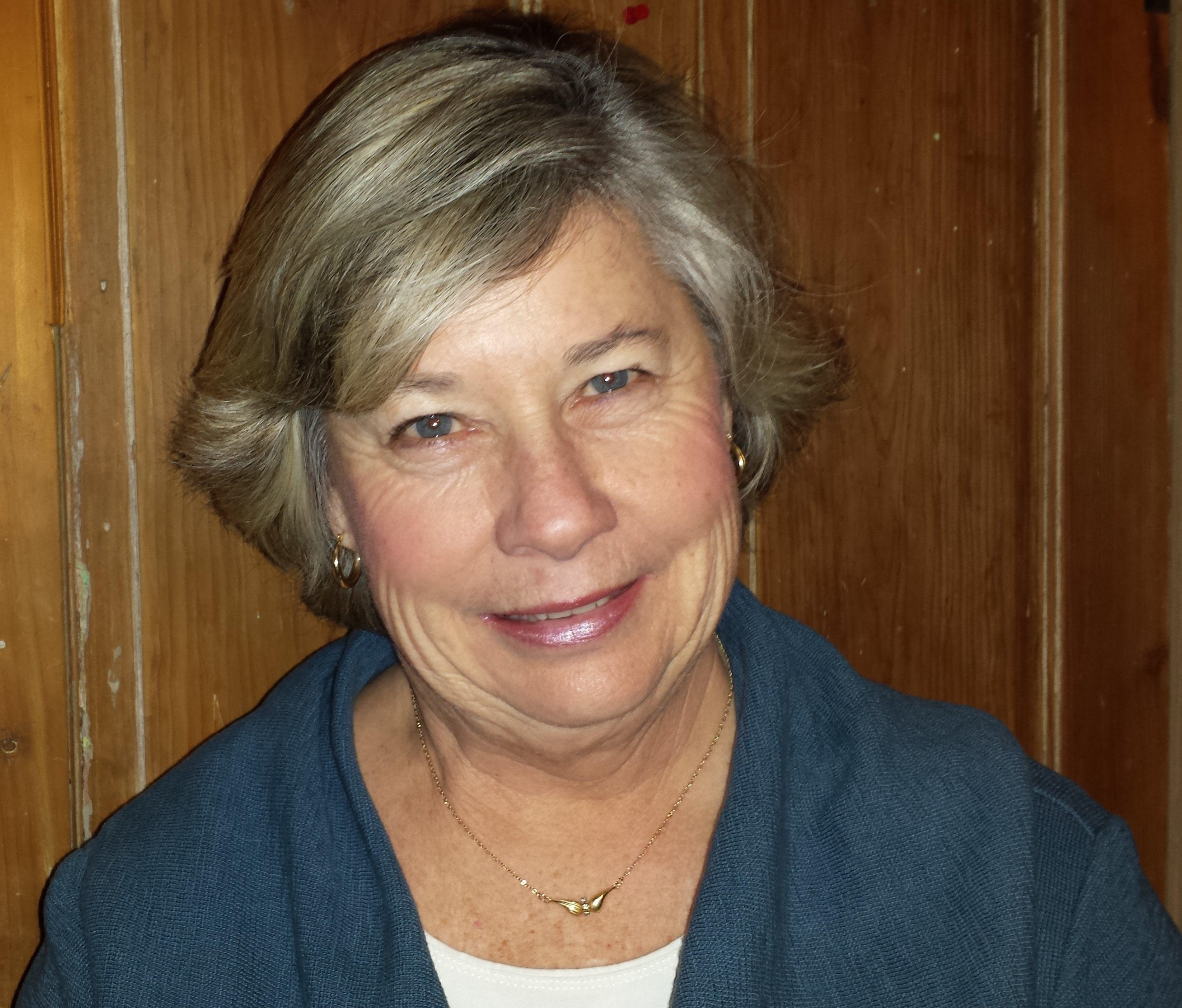 Tedder, Stormwater Permit Writer for EPA New England, Martin Pillsbury, Environmental Program Director for the Metropolitan Area Planning Council, and Debbie Cook (at right), Manager of the Greenscapes Program for the North and South River Watershed Association. The panelists discussed a broad variety of stormwater related topics with an emphasis on identifying innovative strategies to help communities respond effectively to the requirements of the new municipal stormwater management permit forthcoming from EPA. The conversation highlighted the importance of effective public education programs not only for modifying consumer behavior but also for building general support for effective municipal action on stormwater implementation. Also considered were the benefits of various regional cooperative approaches to increase program effectiveness and reduce costs through economies of scale, and the need for communities to establish an adequate base of financial support for stormwater program activities including the possibility of a number of innovative financing mechanisms.
Tedder, Stormwater Permit Writer for EPA New England, Martin Pillsbury, Environmental Program Director for the Metropolitan Area Planning Council, and Debbie Cook (at right), Manager of the Greenscapes Program for the North and South River Watershed Association. The panelists discussed a broad variety of stormwater related topics with an emphasis on identifying innovative strategies to help communities respond effectively to the requirements of the new municipal stormwater management permit forthcoming from EPA. The conversation highlighted the importance of effective public education programs not only for modifying consumer behavior but also for building general support for effective municipal action on stormwater implementation. Also considered were the benefits of various regional cooperative approaches to increase program effectiveness and reduce costs through economies of scale, and the need for communities to establish an adequate base of financial support for stormwater program activities including the possibility of a number of innovative financing mechanisms.
Session 5: Drinking Water
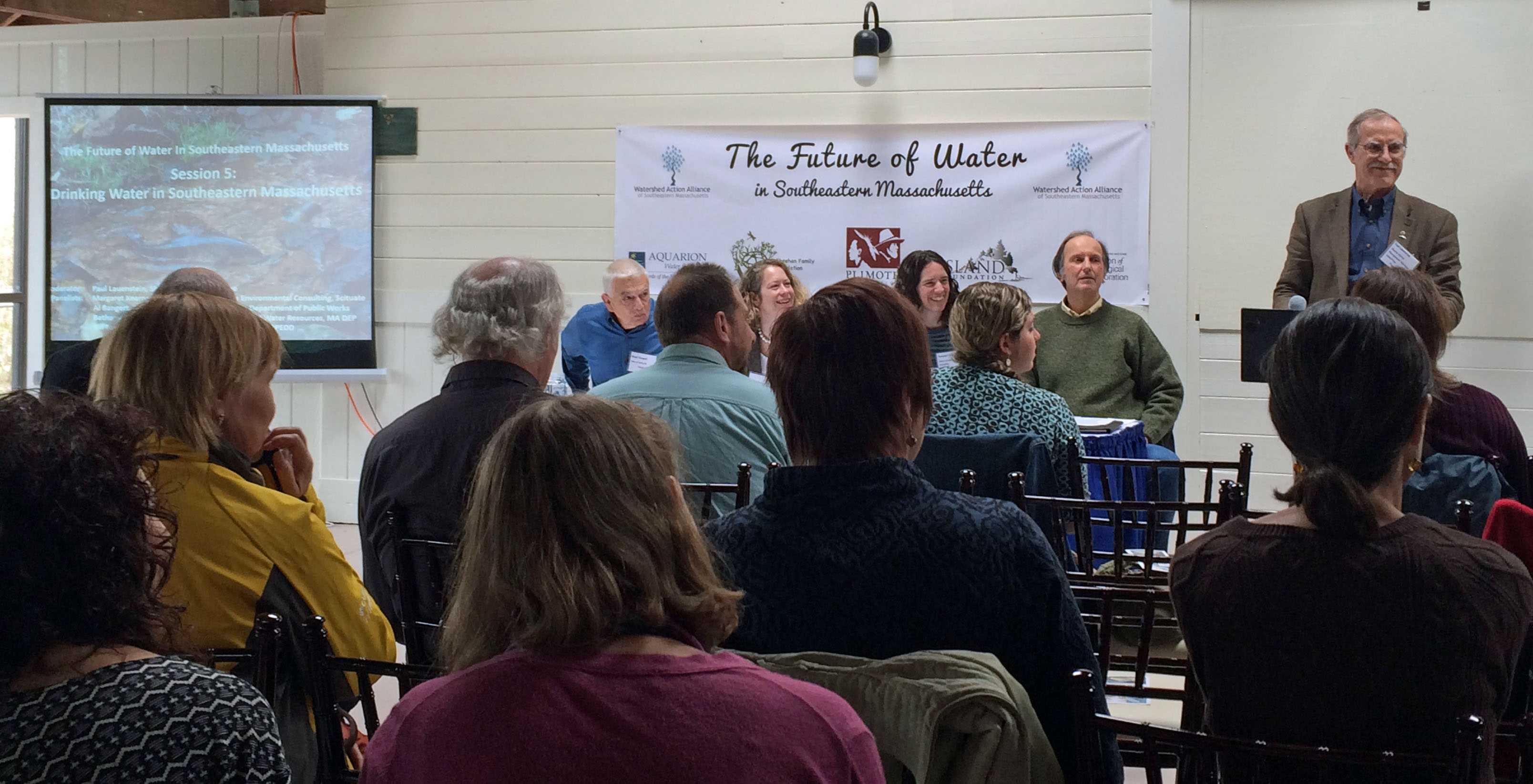
From left to right: Al Bangert, Bethany Card, Margaret Kearns, Bill Napolitano and Paul Lauenstein. Photo by S. Lowell.
The Drinking Water Workshop featured four panelists and a moderator, each of whom provided a unique perspective on the trade-offs between human needs for water and environmental impacts of water withdrawals. Moderator Paul Lauenstein presented the results and key contributing factors of the award-winning water conservation program in Sharon, MA. Aquatic Scientist Margaret Kearns of Corona Environmental Consulting and Al Bangert of the Scituate DPW described their collaboration in Scituate to improve flow in First Herring Brook, while simultaneously supplying the community with high-quality drinking water. MA DEP Deputy Commissioner Beth Card talked about the new water withdrawal permitting regulations promulgated in the wake of the state’s Sustainable Water Management Initiative. Finally, Bill Napolitano, Environmental Program Director for the Southeastern Regional Planning and Economic Development District (SERPEDD), discussed the relationship between water supply, the environment, and the economy in southeastern Massachusetts. All touched on the effectiveness of water conservation as a tool for minimizing environmental impacts, as well as the economic and drinking water quality benefits of improving water use efficiency.
Session 6: Wastewater
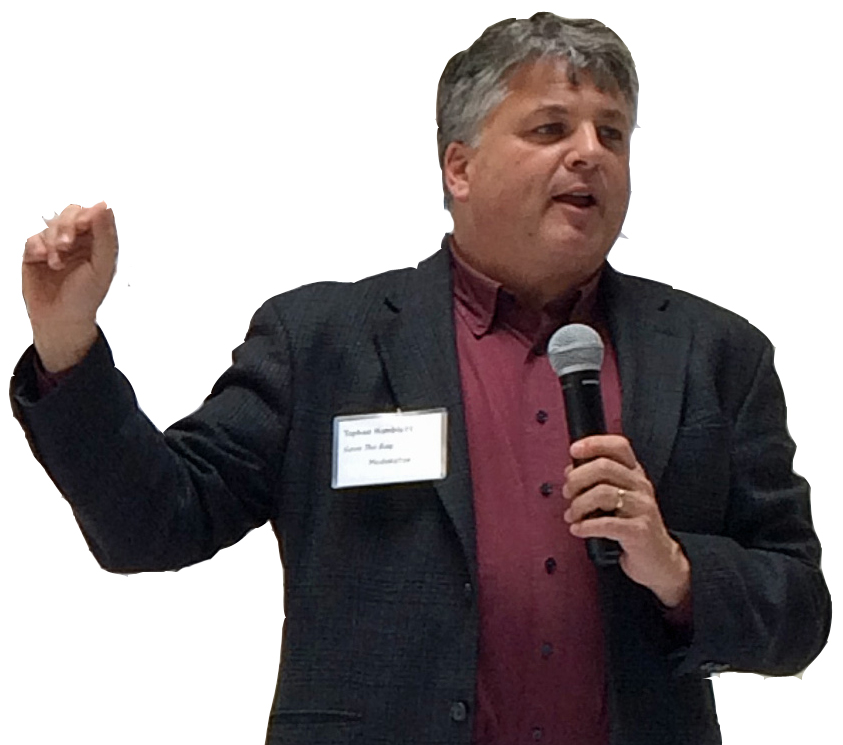 The wastewater session, moderated by Topher Hamblett (at right), Director of Advocacy and Policy for Save The Bay, focused on issues with the EPA permitting of wastewater treatment plants in the Taunton River watershed, and alternative wastewater treatment systems being used to remove nitrogen from effluent on Cape Cod. David Webster, an environmental engineer with three decades of experience with nutrient permitting and water quality issues at the US Environmental Protection Agency, discussed the ongoing permitting process for the City of Brockton and other wastewater treatment plants in the Taunton River watershed. Scott Horsley, a Principal at Horsley Witten Group, discussed techniques being used on Cape Cod to treat nitrogen in ground water and establish newer methods for treating sewage through infiltration.
The wastewater session, moderated by Topher Hamblett (at right), Director of Advocacy and Policy for Save The Bay, focused on issues with the EPA permitting of wastewater treatment plants in the Taunton River watershed, and alternative wastewater treatment systems being used to remove nitrogen from effluent on Cape Cod. David Webster, an environmental engineer with three decades of experience with nutrient permitting and water quality issues at the US Environmental Protection Agency, discussed the ongoing permitting process for the City of Brockton and other wastewater treatment plants in the Taunton River watershed. Scott Horsley, a Principal at Horsley Witten Group, discussed techniques being used on Cape Cod to treat nitrogen in ground water and establish newer methods for treating sewage through infiltration.
Session 7: Recreational Waters
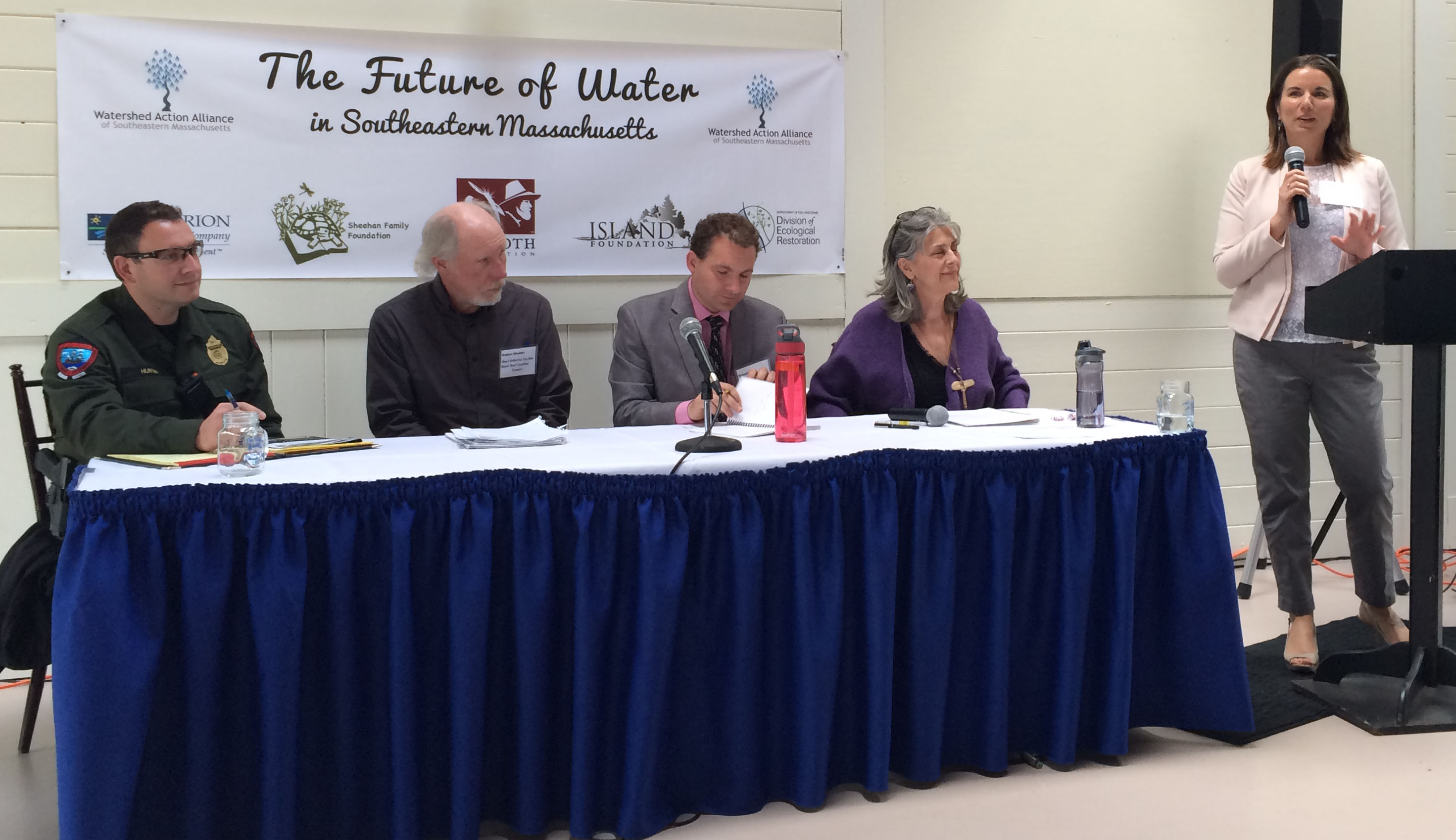
From Left to right: Chad Hunter, Warren Winders, Michael Celona, Cathleen Drinan and Kim Tower.
Our ponds, streams and estuaries provide treasured and time-honored recreational opportunities such as swimming, boating, fishing and shellfishing. Led by moderator Kim Tower, Environmental Technician for the Town of Plymouth’s Department of Marine and Environmental Affairs, four panelists examined issues facing recreational waters and related some success stories. First, Cathleen Drinan, Health Agent for the Halifax Board of Health and Michael Celona of the MA Department of Public Health related the dangers of certain cyanobacteria blooms. These blooms can cause the Board of Health to close ponds to human recreation and threaten wildlife, however, towns can reduce the frequency and length of closures by limiting the amount of phosphorus that enters waterbodies. Warren Winders of Trout Unlimited discussed sea run brook trout and restoration projects for the fish and their local coldwater streams. The session and conference ended on a positive note with a success story related by the final panelist, Chad Hunter, Harbormaster and Shellfish Warden for the Town of Plymouth. After decades of Plymouth Harbor being closed to shellfishing due to polluted waters, work by the Town to increase water quality paid off with the opening of select areas to clamming.
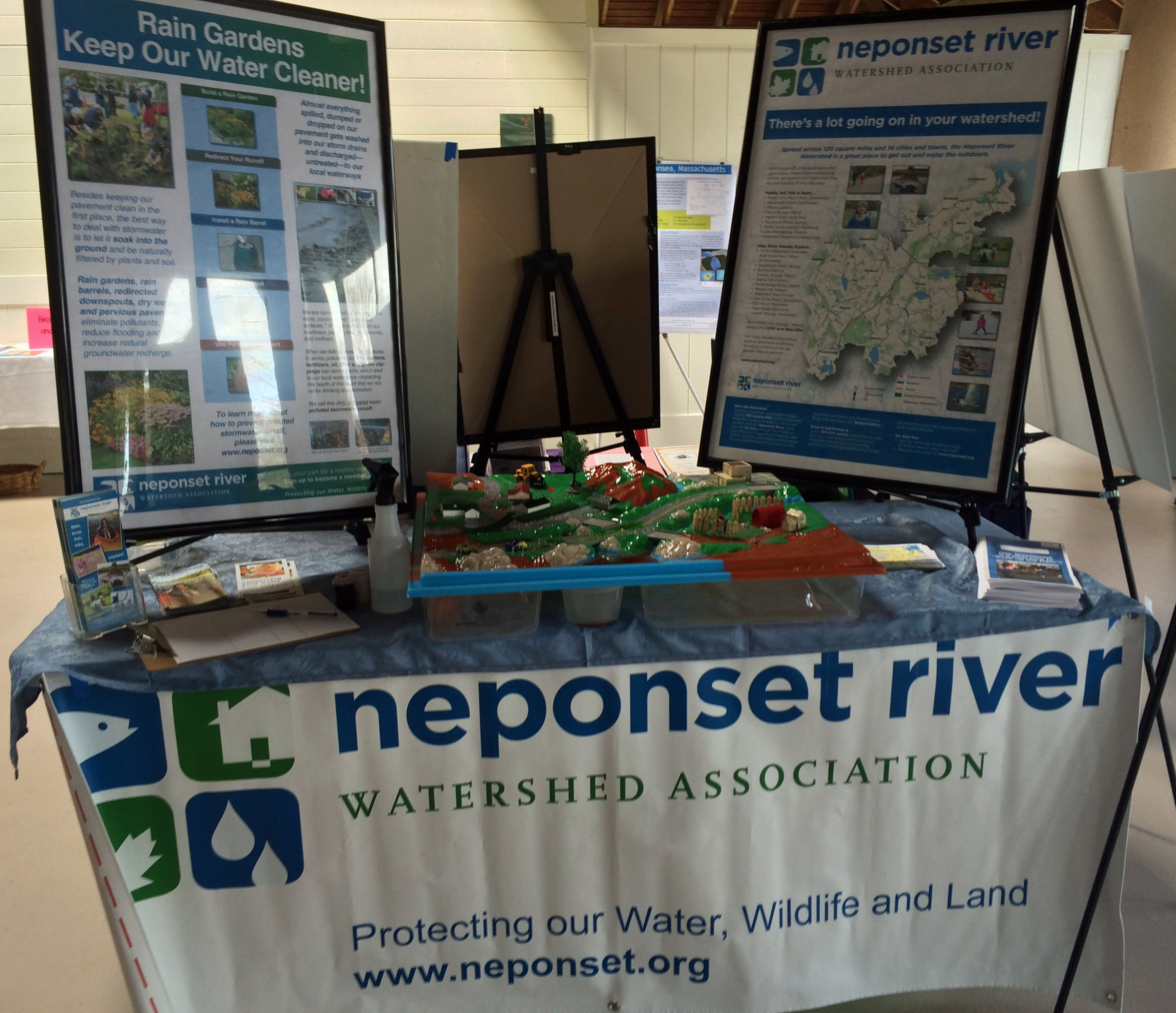
The exhibit hall featured diverse posters and table displays from a mix of national and state nonprofit organizations such as The Nature Conservancy and MassAudubon, state agencies such as the Massachusetts Environmental Trust and Mass. Division of Ecological Restoration, and many local watershed associations. Some of the displays focused on specific projects. For instance, Save The Bay presented a project assessing the health of salt marshes in the Taunton River estuary. The North and South Rivers Watershed Association presented its river restoration projects along the First and Third Herring Brooks. The Goldenrod Foundation and the Neponset River Watershed Association brought interactive displays with educational tools used by volunteers and a watershed model, respectively.
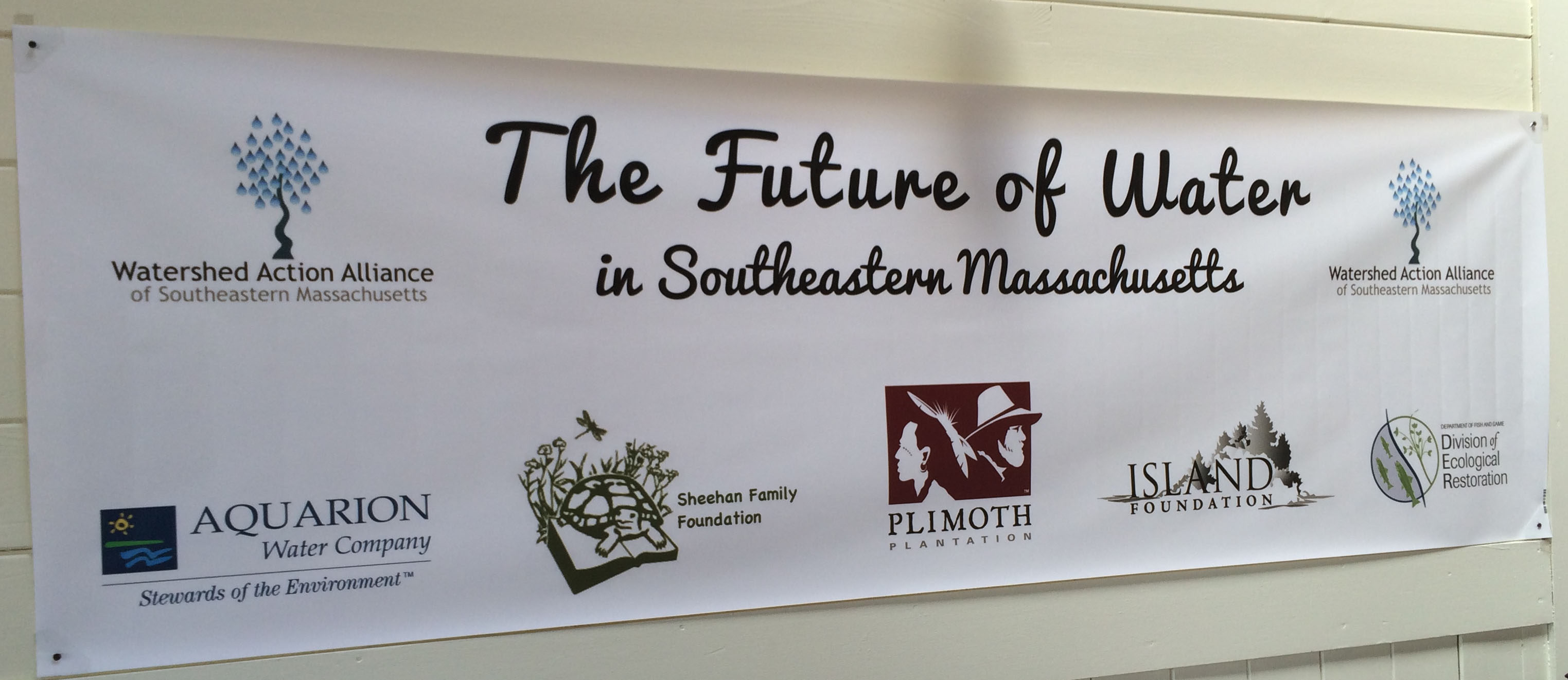
Thanks, also, to our stellar volunteers Leah Hardy, Love Albrecht Howard, Arianna Rozen, and Charlotte Russell.
